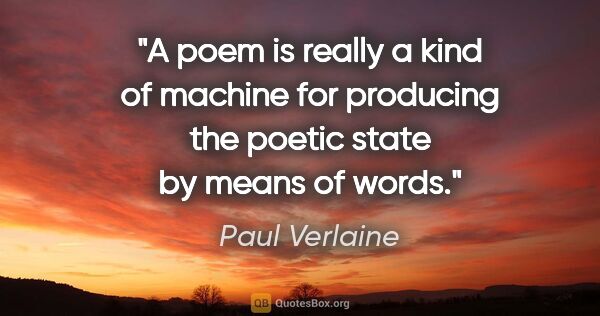Poetical Quotes (page 2)
The poetic impulse is distinct from ideas about things or feelings about things, though it may use these. It's more like a desire to separate a piece of one's experience & set it up on its own, an isolated object never to trouble you again, at least not for a bit. In the absence of this impulse nothing stirs.
Philip Larkin
What, then, is truth? A mobile army of metaphors, metonyms, and anthropomorphisms? in short, a sum of human relations, which have been enhanced, transposed, and embellished poetically and rhetorically, and which after long use seem firm, canonical, and obligatory to a people: truths are illusions about which one has forgotten that this is what they are; metaphors which are worn out and without sensuous power; coins which have lost their pictures and now matter only as metal, no longer as coins.
Friedrich Nietzsche
Truth is a mobile army of metaphors, metonyms, anthropomorphisms, in short, a sum of human relations which were poetically and rhetorically heightened, transferred, and adorned, and after long use seem solid, canonical, and binding to a nation. Truths are illusions about which it has been forgotten that they are illusions. from "On Truth and Lying in an Extra-Moral Sense
Friedrich Nietzsche
Fool! The Ideal is in thyself, the impediment too is in thyself: thy Condition is but the stuff thou art to shape that same Ideal out of: what matters whether such stuff be of this sort or that, so the Form thou give it be heroic, be poetic? O thou that pinest in the imprisonment of the Actual, and criest bitterly to the gods for a kingdom wherein to rule and create, know this of a truth: the thing thou seekest is already with thee, ‘here or nowhere,’ couldst thou only see!
Thomas Carlyle
Her pleasure in the walk must arise from the exercise and the day, from the view of the last smiles of the year upon the tawny leaves and withered hedges, and from repeating to herself some few of the thousand poetical descriptions extant of autumn--that season of peculiar and inexhaustible influence on the mind of taste and tenderness--that season which has drawn from every poet worthy of being read some attempt at description, or some lines of feeling.
Jane Austen
Man's first expression, like his first dream, was an aesthetic one. Speech was a poetic outcry rather than a demand for communication. Original man, shouting his consonants, did so in yells of awe and anger at his tragic state, at his own self-awareness and at his own helplessness before the void.
Barnett Newman





